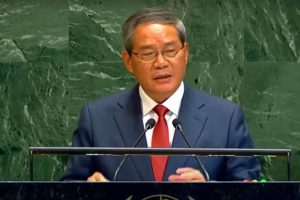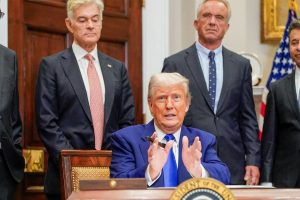Former U.S. President Donald Trump on Tuesday claimed that countries affected by American tariffs are desperate to strike trade deals with him, asserting his negotiation prowess over that of Congress. Speaking at the National Republican Congressional Committee event, Trump said global leaders are “dying to make a deal” and willing to do “anything” to secure agreements with the U.S.
“These countries are calling us up, kissing my a. They’re dying to make a deal—‘Please sir, I’ll do anything,’” Trump said in typically blunt fashion, drawing applause and laughter from the Republican audience.
The remarks were made in the context of the tariff-heavy trade policy Trump championed during his presidency, particularly targeting nations like China. He cited China’s 104% tariffs as a success of his hardline approach, insisting that such aggressive measures would never have been implemented if Congress had been in charge of trade negotiations.
“Congress takes over negotiating, and America gets sold out fast. You’re going to go broke. Let me tell you, you don’t negotiate like I negotiate,” Trump said, criticizing lawmakers—particularly those in his own party—who have called for Congressional oversight on tariff negotiations.
Mocking Congressional efforts, Trump added, “The happiest people in the world would be the Chinese. They wouldn’t be paying 104 percent; they’d be paying zero—and we’d be paying them!”
In a notable policy hint, Trump also announced plans to impose major tariffs on the pharmaceutical sector, aiming to bring drug manufacturing back to the U.S. He argued that America’s dependence on foreign pharma companies puts both the economy and public health at risk.
“We don’t make our own pharma drugs. They’re made elsewhere, and we’re paying ten times the cost. We’re going to tariff pharma in a way that companies will come rushing back,” he said. “We’re a huge market, and when these companies hear what’s coming, they’ll leave China and other countries and open their plants here.”
Trump’s rhetoric reinforced his “America First” trade agenda, which he is likely to spotlight as he campaigns for a return to the White House. He framed tariffs not only as a tool of economic leverage but as a way to reassert U.S. dominance in global manufacturing and negotiations.





